Recipe Operations for IEC 
See also: IEC 61131 Language Editor Programming
See also: Project Toolbox for IEC
Topic Menu
Home > View > Project Toolbox> Recipe Operations
Load Recipe by Index 
Operator - The load function allows an operator to select a product from the specified recipe. Once selected the settings for the appropriate recipe will be loaded in to the registers specified for the recipe.
Inputs
EN – (Type: BOOL) - The "EN" input is a condition. If EN is TRUE State then block is executed.
#Rcp - (Type: DINT) - Recipe number. First Recipe = 0, Second Recipe = 1 and so on.
Index - (Type: DINT) - Index specifies the Product. Here First Product = 1, Second Product = 2 and so on.
@Status - (Type: DINT) - A 16-bit register used to hold the results of the element.
Outputs
Q : Output (Type: BOOL)
ST Language
Q := LOADRCPBYINDEX (EN1(*BOOL*), 16#0 (*DINT*), 1(*DINT*), Status (*DINT*) );
FBD Language

LD Language
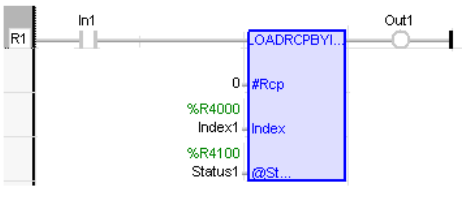
IL Language
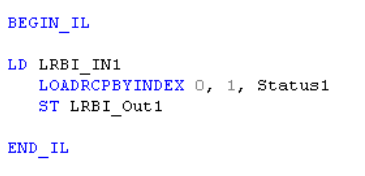
Return to the Top: Recipe Operations for IEC
Load Recipe by String 
Operator - The load function allows an operator to select a product from the specified recipe. Once selected the settings for the appropriate recipe will be loaded in to the registers specified for the recipe.
Inputs
EN – (Type: BOOL) - The "EN" input is a condition. If EN is TRUE State then block is executed.
#Rcp - (Type: DINT) - Recipe number. First Recipe = 0, Second Recipe = 1 etc.
#Name - (Type: String) - Name of the Product
@Status - (Type: DINT) - A 16-bit register used to hold the results of the element.
Outputs
Q : Output (Type: BOOL)
ST Language
Q1:= LOADRCPBYSTR (EN2 (*BOOL*), 16#1 (*DINT*), 'Product 5' (*STRING*), Status3 (*DINT*) );
FBD Language

LD Language
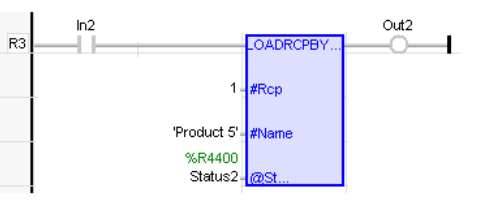
IL Language
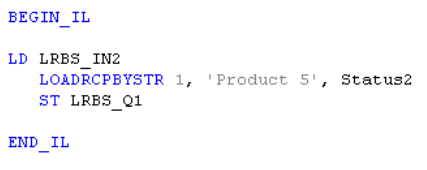
Return to the Top: Recipe Operations for IEC
Load Recipe by USINT 
Operator - The load function allows an operator to select a product from the specified recipe. Once selected the settings for the appropriate recipe will be loaded in to the registers specified for the recipe.
Inputs
EN – (Type: BOOL![]() Boolean- [Data Type BOOL] - A single bit, binary value, or register/variable. Boolean points have only two possible values, 'TRUE' or 'FALSE'.) - The "EN" input is a condition. If EN is TRUE State then block is executed.
Boolean- [Data Type BOOL] - A single bit, binary value, or register/variable. Boolean points have only two possible values, 'TRUE' or 'FALSE'.) - The "EN" input is a condition. If EN is TRUE State then block is executed.
#Rcp - (Type: DINT![]() Double Integer - [Data Type DINT] - A 32-bit signed value. Double Integers are used where the value of the data is expected to be in the range of -2,147,483,648 to +2,147,483,647.) - Recipe number. First Recipe = 0, Second Recipe = 1 etc.
Double Integer - [Data Type DINT] - A 32-bit signed value. Double Integers are used where the value of the data is expected to be in the range of -2,147,483,648 to +2,147,483,647.) - Recipe number. First Recipe = 0, Second Recipe = 1 etc.
Name[] - (Type: USINT![]() Unsigned Short Integer - [Data Type USINT] - An 8-bit unsigned value. Unsigned Short Integers are used where the value of the data is expected to be in the range of 0 (zero) to 255.[]) - Name of the Product assigned through array of registers.
Unsigned Short Integer - [Data Type USINT] - An 8-bit unsigned value. Unsigned Short Integers are used where the value of the data is expected to be in the range of 0 (zero) to 255.[]) - Name of the Product assigned through array of registers.
@Status - (Type: DINT![]() Double Integer - [Data Type DINT] - A 32-bit signed value. Double Integers are used where the value of the data is expected to be in the range of -2,147,483,648 to +2,147,483,647.) - A 16-bit register used to hold the results of the element.
Double Integer - [Data Type DINT] - A 32-bit signed value. Double Integers are used where the value of the data is expected to be in the range of -2,147,483,648 to +2,147,483,647.) - A 16-bit register used to hold the results of the element.
Outputs
Q : Output (Type: BOOL)
ST Language
Q2 := LOADRCPBYSTR2 (EN3 (*BOOL*), 16#2 (*DINT*), Name (*USINT*), Status5 (*DINT*) );
FBD Language

LD Language
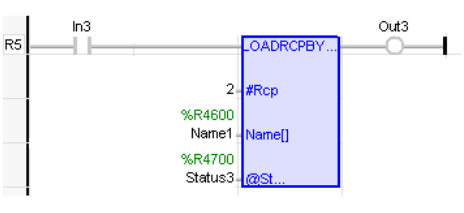
IL Language
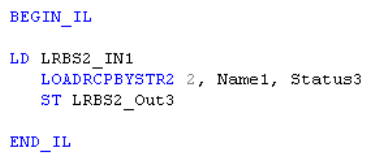
Return to the Top: Recipe Operations for IEC
Save Recipe by Index 
Operator - The Save function allows an operator to save the current working settings for a recipe to a product setting. For example if the settings for a previously saved product have been altered for improved machine operation, the operator can save the adjusted settings back to the recipe database.
Inputs
EN – (Type: BOOL) - The "EN" input is a condition. If EN is TRUE State then block is executed.
#Rcp - (Type: DINT) - Recipe number. First Recipe = 0, Second Recipe = 1 and so on.
Index - (Type: DINT) - Index specifies the Product. Here First Product = 1, Second Product = 2 and so on.
@Status - (Type: DINT) - A 16-bit register used to hold the results of the element.
Outputs
Q : Output (Type: BOOL)
ST Language
Q: SAVERCPBYINDEX (EN1 (*BOOL*), 0 (*DINT*), 2 (*DINT*), Status2 (*DINT*) );
FBD Language

LD Language
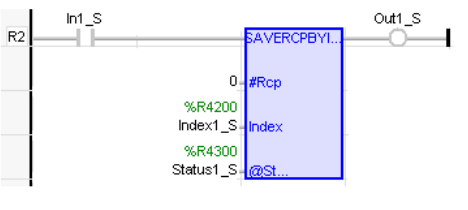
IL Language
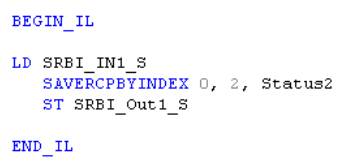
Return to the Top: Recipe Operations for IEC
Save Recipe by String 
Operator - The Save function allows an operator to save the current working settings for a recipe to a product setting. For example if the settings for a previously saved product have been altered for improved machine operation, the operator can save the adjusted settings back to the recipe database.
Inputs
EN – (Type: BOOL) - The "EN" input is a condition. If EN is TRUE State then block is executed.
#Rcp - (Type: DINT) - Recipe number. First Recipe = 0, Second Recipe = 1 etc.
#Name - (Type: String) - Name of the Product
@Status - (Type: DINT) - A 16-bit register used to hold the results of the element.
Outputs
Q : Output (Type: BOOL)
ST Language
Q1:= SAVERCPBYSTR (EN2 (*BOOL*), 1 (*DINT*), 'Product 3' (*STRING*), Status2_S (*DINT*) ) ;
FBD Language

LD Language
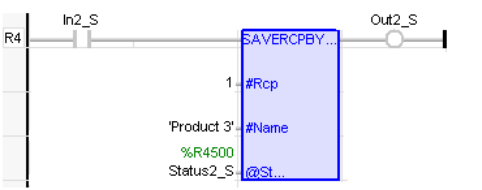
IL Language
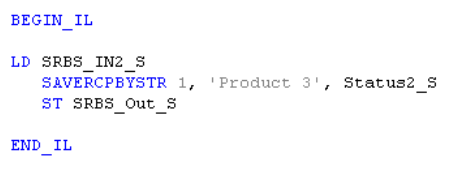
Return to the Top: Recipe Operations for IEC
Save Recipe by USINT 
Operator - The Save function allows an operator to save the current working settings for a recipe to a product setting. For example if the settings for a previously saved product have been altered for improved machine operation, the operator can save the adjusted settings back to the recipe database.
Inputs
EN – (Type: BOOL) - The "EN" input is a condition. If EN is TRUE State then block is executed.
#Rcp - (Type: DINT) - Recipe number. First Recipe = 0, Second Recipe = 1 etc.
Name[] - (Type: USINT[]) - Name of the Product assigned through array of registers.
@Status - (Type: DINT) - A 16-bit register used to hold the results of the element
Outputs
Q : Output (Type: BOOL)
ST Language
Q2:= SAVERCPBYSTR2 (EN3 (*BOOL*), 2 (*DINT*), Name_S (*USINT*), Status6 (*DINT*) );
FBD Language

LD Language
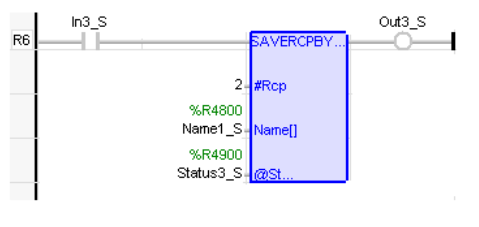
IL Language
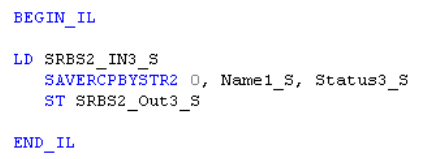
Return to the Top: Recipe Operations for IEC